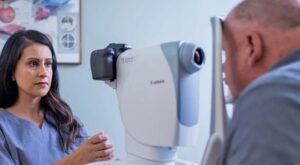
An eye exam at the VA. Ophthalmologists are objecting to increased scope of practice for optometrists, who have less training. VA photo
WASHINGTON, DC — VA is working to establish a set of national credentials for more than 50 healthcare occupations, allowing the department to transfer care workers more easily from state to state.
According to VA, individual state credentialing guidelines vary minimally, making the project essentially an exercise in cutting through red tape when moving workers to facilities where they’re most needed.
For some professions—nurse anesthetists and optometrists, specifically—there are key differences in state scope of practice laws, however. That is pitting organizations supporting the interests of those professions against organizations concerned those professions are being given too much responsibility, with VA caught in the middle.
For certified registered nurse anesthetists (CRNAs), the issue comes down to whether they are allowed to anesthetize a patient without supervision. According to the American Society of Anesthesiologists (ASA), they should not.
“VA has the right anesthesiology practices in place right now,” declared Ronald L. Harter, MD, ASA president, at a VA Health Oversight Subcommittee hearing last month. “This is a solution in search of a problem. There’s no shortage of anesthesiologists in VA. There are only 22 position vacancies out of a thousand total positions.”
He added, “There are 100 members of ASA that were CRNAs before they made the decision to go to medical school for four years and then four years of residency. Why would they spend those years doing that if there was nothing left for them to learn?”
Janet Setnor, MSN, CRNA, president of the American Association of Nurse Anesthesiologists and a retired Air Force colonel, said that CRNAs are called upon to work without supervision in the military and that it is “reprehensible to restrict that care to veterans at home.”
She noted that both the ASA and the American Medical Association, which also provided testimony at the hearing, have a vested interest in protecting the territory of its member physicians and have spent millions to impede advanced practice registered nurses from practicing to the scope of their education and training.
“I’m frustrated that my profession has to constantly defend its value purely for political and self-serving financial reasons,” she said. “Both anesthesiologists and CRNAs should be available to provide direct patient services. And that VA facilities should be able to choose their most suitable anesthesia delivery model.”
Laser Eye Surgery
For optometrists, the issue is whether they should be able to perform laser eye surgery. Currently, only 10 states allow optometrists to perform these procedures, leaving surgery to ophthalmologists who receive surgical training.
“We strongly believe that optometrists are vital members of the eye care team,” explained Dr. Stephen McLeod, MD, CEO of the American Academy of Ophthalmology. “However, our efforts recognize the different training, skill and expertise of each team member. With medical doctors of extensive surgical training with thousands of hours devoted to eye surgery, only ophthalmologists possess the expertise and experience required to perform eye surgery and to address the potential complications that arise.”
In those states where optometrists’ licenses allow them to perform laser surgery, the training is frequently held in a hotel setting rather than a clinical one.
“An optometrist trained under these conditions may in fact attempt their first unsupervised laser cases having never used the equipment on a human eye,” McLeod told the subcommittee.
According to VA officials, it’s possible under their forthcoming federal practice guidelines that optometrists licensed in the 10 states that allow them to perform surgery will transport that skill to VA facilities in states that do not.
“We are currently evaluating whether the national standard of practice will authorize optometrists licensed in the 10 states [to perform surgical procedures] to operate in the full scope of their license,” explained Erica Scavela, MD, VA’s chief medical officer. “It’s all under review and consideration based on our listening sessions.”
As for CRNAs, VA has contracted researchers at Temple University in Philadelphia to conduct an independent review of individual states’ licensure requirements and analyze the difference in CRNA practice across the country. That data will be used to determine the VA CRNA national standard.
“However, [these guidelines] will not undue the long-standing team-based model of care already established in VA,” Scavela explained. “The national standards of practice are intended to strengthen team-based care and thereby generate the best possible access and outcomes for veterans.”
